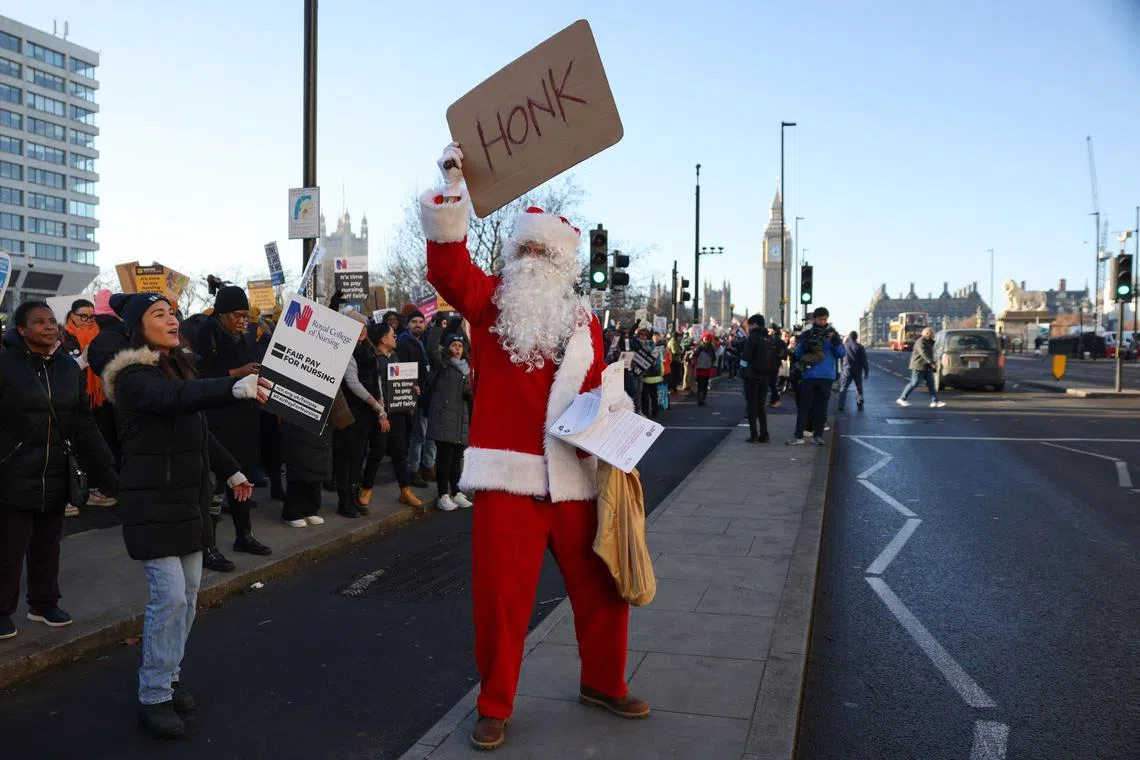Britons told to call an ambulance only if life is in danger
Sign up now: Get ST's newsletters delivered to your inbox

A demonstrator dressed as Father Christmas on a picket line during a strike by NHS nursing staff in London.
PHOTO: BLOOMBERG
LONDON – People in Britain can call 999 if they have chest pains but shouldn’t disturb the emergency services for problems that aren’t life threatening, a health minister said as nurses and ambulance workers go on strike.
Mr Will Quince, minister for health and secondary care, said he has “been really clear with unions that there is a minimum service level” expected during the industrial action, which he accepted would cause disruption.
Nurses are staging a second walkout
One nurse on a picket line said it was “a scary time to be unwell at the moment” due to pressure on the health system.
“Life threatening and emergency care when it comes to ambulance cover should continue,” Mr Quince told the BBC. “If you have chest pains, then continue to call 999 as you would in ordinary times.”
“If it’s not life threatening, then it’s really important people call NHS 111,” he added, referring to the service’s non-emergency advice line.
The country’s National Health Service (NHS) faces a deepening crisis this week, with nurses threatening more strikes in the months to come.
The military is on standby to send 600 drivers and 150 support staff to fill in for striking ambulance workers, but they can’t drive above the speed limit or pass red traffic lights.
A further 625 military personnel are on standby to cover Border Force strikes over Christmas.
Late talks
Mr Onay Kasab, national lead officer for the Unite union, told Times Radio on Tuesday that the meeting between Health Secretary Steve Barclay, Mr Quince and the unions is expected to last just half an hour.
“That’s all that’s been set aside by the government for that meeting,“ he said. “And that will only discuss the emergency cover issues, and they are refusing to discuss pay. So it’s quite simple. We want negotiations, meaningful negotiations, to discuss pay, and tomorrow doesn’t have to happen.”
The joint actions by nurses and ambulance workers add to a growing crisis in the NHS,
“The government needs to listen,” said Mr James Coop, an ambulance worker who joined the nurses’ picket line on Tuesday to show support for his health service colleagues. “And until they listen, we’ll keep striking.”
Food banks
Last week, nurses on the picket line told Bloomberg News that they were resorting to food banks or eating food intended for their patients
Prime Minister Rishi Sunak’s spokesman, Mr Max Blain, urged NHS workers to moderate their stance.
“We would expect, given this late stage, some sort of disruption either way, but it is still in the gift of unions to step back,” he told reporters on Monday.
“We firmly believe that inflation is the biggest enemy that eats away at people’s pay packet” he added, saying that the government did not want to “embed” inflation with pay raises that keep pace with it.
Mr Barclay, the health secretary, toured King’s College Hospital in London on Monday, where he was confronted by the mother of a three-year-old-daughter with cystic fibrosis, who told him that she witnessed staff “worked to the bone”. BLOOMBERG


